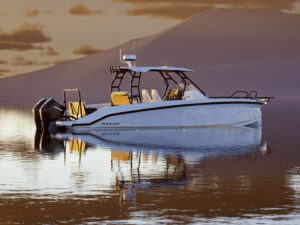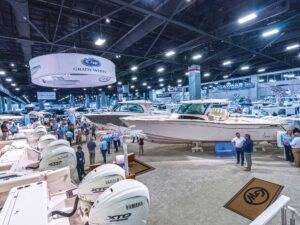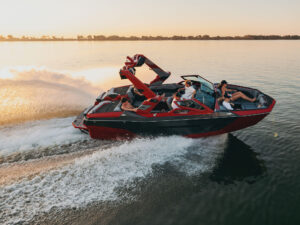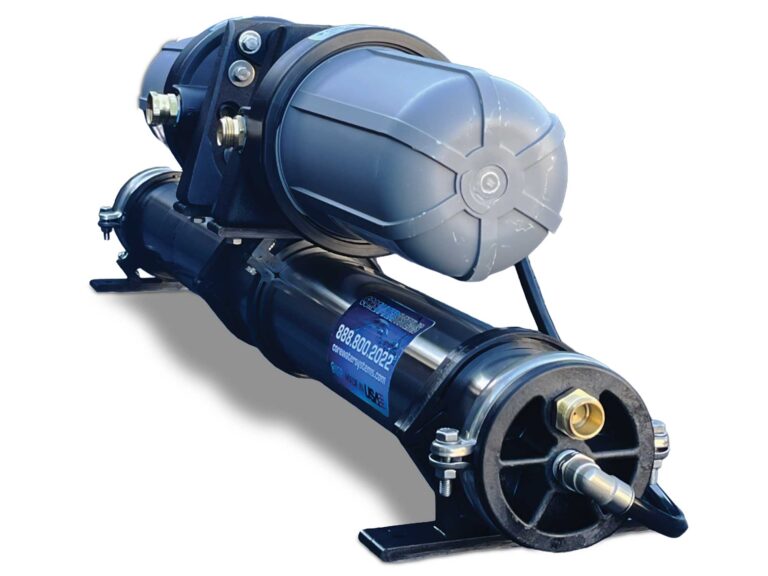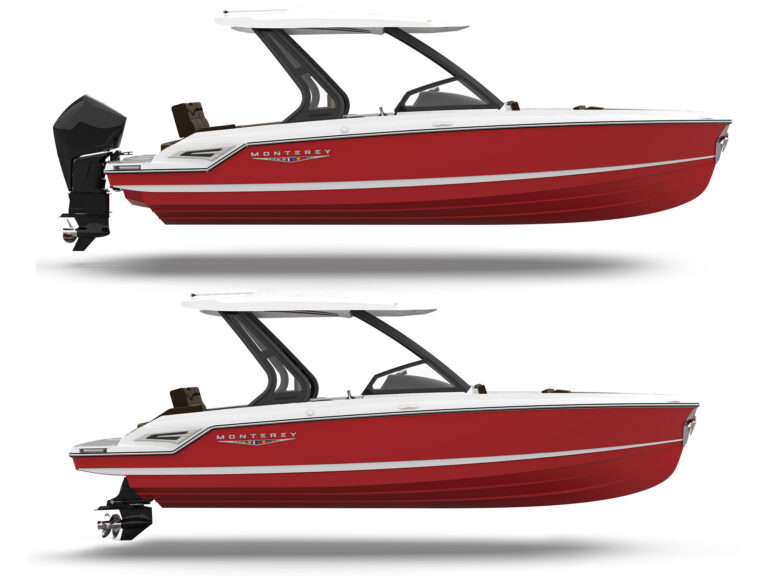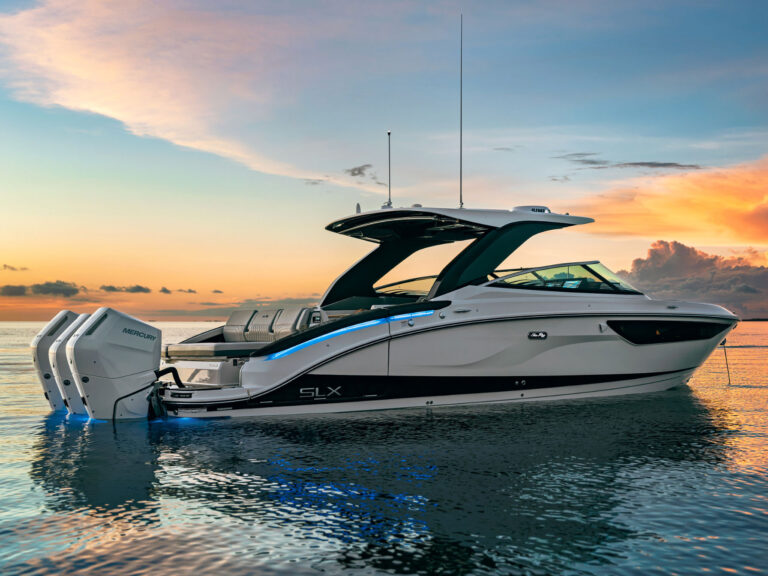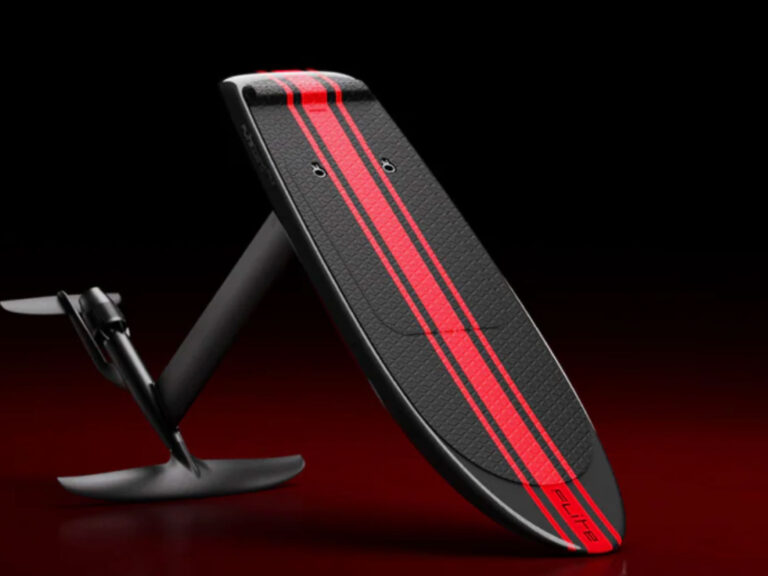
Overview
From above, the MJM 4 looks like an oversize bowrider with a contoured hardtop powered by up to 1,200 hp of twin or triple outboards. Convenient cockpit access is through a starboard-side gunwale door or the swim platform. The main deck layout is ideal for temperate climates because the open cockpit lounge connects to the hardtop-covered salon, then back outside to the bow lounge.

Interior and Accessories
The bow lounge offers an open sunning area and a great place to ride with the wind in your hair. Behind the windshield under the hardtop, windows and hatches in the salon/helm can open to the breeze, or seal them for climate control when using the optional reverse-cycle heat and air conditioning ($26,767). The L-shaped aft cockpit lounge features a removable teak table for alfresco dining, which easily covers with a stout Bimini with strut-shaped tensioning turnbuckles that allow its use while running.
What the gull’s-eye view doesn’t show is that the MJM 4 offers belowdecks amenities. In the cabin, we found a flat-screen TV and a forward lounge/berth. Another double berth tucked under the salon floor includes a fan and a convenient cubby with phone-charging plugs. There are opening hatches for ventilation and good-looking cherry-paneled storage. A Tecma freshwater flush electric head and separate shower compartment complete these accommodations.

We don’t know of another boat this size that offers large bow and aft cockpits, a pilothouse and relatively spacious cruising accommodations. Shoppers might consider Tiara’s luxurious and beamier 43LS ($1,337,900 powered like our test boat), which offers comparable performance but a center-console layout. One might also look at Formula’s smaller 350 CBR ($781,120 with triple 300 Mercury Verados and joystick), which offers a semi-enclosed helm and fore and aft cockpits.
Engines
The flexible layout of the MJM 4 sparked my interest, but its twin 600 hp Mercury V-12 Verados had me itching to throw down the throttles. These massive engines prove eerily quiet. Using the joystick, which provides an additional 15 degrees of turning radius, we eased stealthily sideways off the dock. There is no clunking during shifting—just smooth control. As you may know, only the gear case of these engines turns while the midsections and powerheads remain stationary. Primarily, the articulating gear cases allow these big engines to mount on 27-inch centers like other smaller multi–engine installations, so more can fit on any given transom.

I cranked the boat up to a zippy top speed just under 55 mph. Acceleration was smooth, with the shifting of the two-speed transmission barely perceptible. The Garmin 12-inch MFD showed a top speed of 60.4 mph that I couldn’t replicate given our test boat was laden with a ton of boat-show equipment and brochures. (We ran it the length of Long Island Sound from the Newport Boat Show to the Norwalk Boat Show.)
A fast cruise of 44.5 mph burned 67 gph, giving a range of 285 miles with a 10 percent reserve. More impressive is the lack of bow rise, nor any slamming or flexing of the hull as we ran into the chop. The narrow entry slices through sloppy conditions, and spray is deflected aside. According to MJM, the in-house design team added more bow flare to the MJM 4. I looked in the front and saw the uncovered bow seats were dry.

Hitting rougher water, I slowed to 28.6 mph. We ran all day heading into the wind and chop funneling out of Long Island Sound at this speed, netting a range of 365 miles. During high-speed turns, the MJM 4 gently leaned and sliced through the choppy waves while the big Mercs purred like giant kittens. Even at wide-open throttle, sound readings never exceeded 86 decibels, most of which was from the wind and water, not the engines.
One reason the MJM 4 handles well in rough conditions is the boat’s vacuum-infused epoxy-composite construction. MJM uses biaxial E-glass and Corecell foam core in the hull and deck. The keel, stem and transom corners are solid E-glass. After layup, the parts are post-cured (warmed at a precise temperature). This type of epoxy construction yields boats with tremendous strength-to-weight ratios. The MJM 4 fully loaded weighs only 17,730 pounds. Lightweight and rigid structure combine to help seakeeping and performance, as does the relatively narrow beam and hull refinement, of course.
The MJM 4 is fast and fun to drive. It’s a must-see for those seeking a top-of-the-line outboard-powered dayboat.

How We Tested
- Engines: Twin 600 hp Mercury V-12 Verados
- Drive/Props: Outboard/27″ pitch contra-rotating stainless-steel prop sets
- Gear Ratio: 2.50:1 Fuel Load: 375 gal. Water on Board: 90 gal. Crew Weight: 790 lb.
High Points
- Layout offers fore-and-aft flow plus multiple social areas.
- Lightweight epoxy-composite hull with a fine entry and relatively narrow beam helps the boat perform.
- Twin Mercury Verado 600s with joysticks are fast, quiet and smooth-running, and their steerable gear cases make the boat easy to maneuver.
Low Points
- Midberth offers only 2 feet, 1 inch of headroom, which is tight for adults.
- No door separating the sleeping areas.
- Fuel fills and opening door are only to starboard.
Pricing and Specs
| Price: | $1,523,955 (base with test power) |
| LOA: | 46’8″ |
| Beam: | 12’0″ |
| Draft: | 2’2″ (engines up) |
| Displacement (approx.): | 17,730 lb. |
| Transom Deadrise: | 18.6 degrees |
| Bridge Clearance: | 9’8″ (mast up) |
| Max Cabin Headroom: | 6’10” |
| Fuel Capacity: | 475 gal. |
| Max Horsepower: | 1,200 |
| Available Power: | Triple 300 hp Mercury Verado outboards; twin 600 hp Mercury V-12 Verado outboards; twin 400 hp Volvo Penta D6 diesel sterndrives |
Speed, Efficiency, Operation

MJM Yachts – Washington, North Carolina; 252-644-6001; mjmyachts.com

